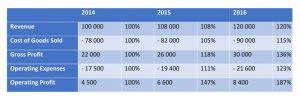What does a bookkeeper do? Article
Content

When you order inventory, your bookkeeper collects the receipt, enters the transaction into the general ledger, and files the record into your financial database. Bookkeepers are primarily responsible for maintaining a company’s general ledger, which entails recording daily transactions, deposits, and income. The majority of bookkeepers work in the professional, scientific, and technical services industry. Individuals working as accountants typically have at least a 4-year degree (a bachelor’s) in accounting or a similar field, though some businesses require their accountants to have a master’s.
- Many of these bookkeepers work from home, making their own hours.
- Additionally, data is encrypted at the highest levels so that even if a breach were to occur, your data and information stay unreadable.
- The core function of a bookkeeper is to ensure that all bills are paid on time, transactions are recorded correctly, payroll runs on time and taxes are filed correctly.
- Preparing invoices and sending them to clients is usually the bookkeeper’s responsibility.
- In 2016, the financial industry accounted for 12 percent of all bookkeepers.
- You can find bookkeeping courses on standard bookkeeping work tools like accounting software and financial reports.
Bookkeepers help business owners to maintain their business’ financial records. This can include recording sales, revenue, and expenses, check statements for accuracy, verify receipts, billing and account receivables and payroll. As well as being comfortable with numbers, organizational skills are particularly important for people in this role. Most companies rely on accounting software to handle the daily bookkeeping. Having experience in those software programs makes you a more attractive candidate to a company hiring a bookkeeper.
What is a Bookkeeper?
The median salary is the halfway point with half of bookkeepers making less and half making more. I would love to learn more using the free 3 part training class, but after several attempts, never received the video via email.
The point here is that hiring a CFA means bringing highly advanced accounting knowledge to your business. A CPA is an accountant who has met their state’s requirements and passed the Uniform CPA Exam. They must also meet ongoing education requirements to maintain their accreditation. As your business grows to include more customers, vendors, and employees, keeping track of your finances on your own becomes more challenging. According to the BLS, CPAs earned a median annual salary of $73,560 as of 2020. CPA salaries outpace bookkeepers’ median earnings, which the BLS reports as $42,410 per year.
Can I Really Become A Bookkeeper Without A Degree?
They both require a sharp eye that keeps track of relevant data, yet, they do have their differences. If so, check out this guide https://www.bookstime.com/ on how to start a bookkeeping business. One organization to look into is The American Institute of Professional Bookkeepers.
Can you be a bookkeeper without qualifications?
You don't need accounting qualifications but some level of knowledge can't hurt, especially when you're often the messenger between the business owner and their accountant.
This is a great route to gain some real-world experience as you become a bookkeeper and, potentially, a bookkeeping business owner. Previous work experience makes finding clients as a bookkeeping business owner much easier. Did you know that you can learn how to become a bookkeeper in less than one year with no experience? This makes bookkeeping a popular choice for those without degrees or those ready for a career change. The records reported by the bookkeeper will determine the accountant’s advice to leadership, and ultimately, the health of the business overall. Each piece of the financial process is just as important as the next. While these financial roles share common goals, they support different stages of the accounting process.
Average salary
The good news is that you can do bookkeeping training from the comfort of your home. There are a lot of cheap bookkeeping courses online and a lot of free content too. You can find bookkeeping courses on standard bookkeeping work tools like accounting software and financial reports. To be an accountant, you generally need education requirements like a bachelor’s degree in accounting. A bookkeeper who is self-employed running her own bookkeeping business may take on a broader range of duties than their peers. They will likely have to track their own finances including income and expenses, for example. They will also be required to make their own tax payments and make sure their business remains in compliance with local and state law.

There are opportunities for forensic accountants in many industries, like nonprofit work, government and law-enforcement agencies, law firms, and large corporations. Bookkeepers who are interested in switching jobs but do not have a college degree might consider becoming an EA after a stint with the IRS.
When to hire a financial professional
Historically, bookkeepers have benefitted from strong demand among small and mid-sized businesses. As of 2020, there were more than 1.6 million bookkeeping jobs in the United States. As you begin the process of drafting your job description, consider putting together the top 10 functions of a bookkeeper for your company. You want to make sure that these are clearly reflected in your job description so that candidates understand your specific needs and how their skills align with those needs. After completing your education, you can seek an internship and get on-the-job training to become a bookkeeper. However, it helps to have a two- or four-year degree in accounting, finance or related discipline.

Read the job description and include any applicable keywords on your resume or in your cover letter. This is true whether you do the work yourself or hire someone to do it for you. Having an accountant manage your monthly business reconciliation and reporting is important.
These workers record financial details, update financial statements, and read over financial documents for accuracy. If there is a problem or miscalculation within an organization’s accounting or books, it is the bookkeeper’s job to find and fix it. The majority of the work revolves around numbers, particularly using various accounting principles and math skills to keep financial records for companies. The specifics of the job depend largely on the type of company you work for, but the basics of the bookkeeper daily routine are similar from one position to the next.
Forbes Advisor adheres to strict editorial integrity standards. To the best of our knowledge, all content is accurate as of the date posted, though offers contained herein may no longer be available.
We would be happy to teach and train a dependable and enthusiastic candidate with a background in bookkeeping in areas where they have no experience. People often confuse bookkeepers and accountants—and with good reason. While there are certain similarities and overlaps between the two, there are distinctions that set these two roles apart. Bookkeepers don’t necessarily what is bookkeeping experience need higher education in order to work in their field while accountants can be more specialized in their training. Because bookkeepers tend to work for smaller companies, they may not be paid as much as accountants. Knowing the differences between the two can help people find their niche in the industry and can give guidance to companies on who to hire for their needs.


